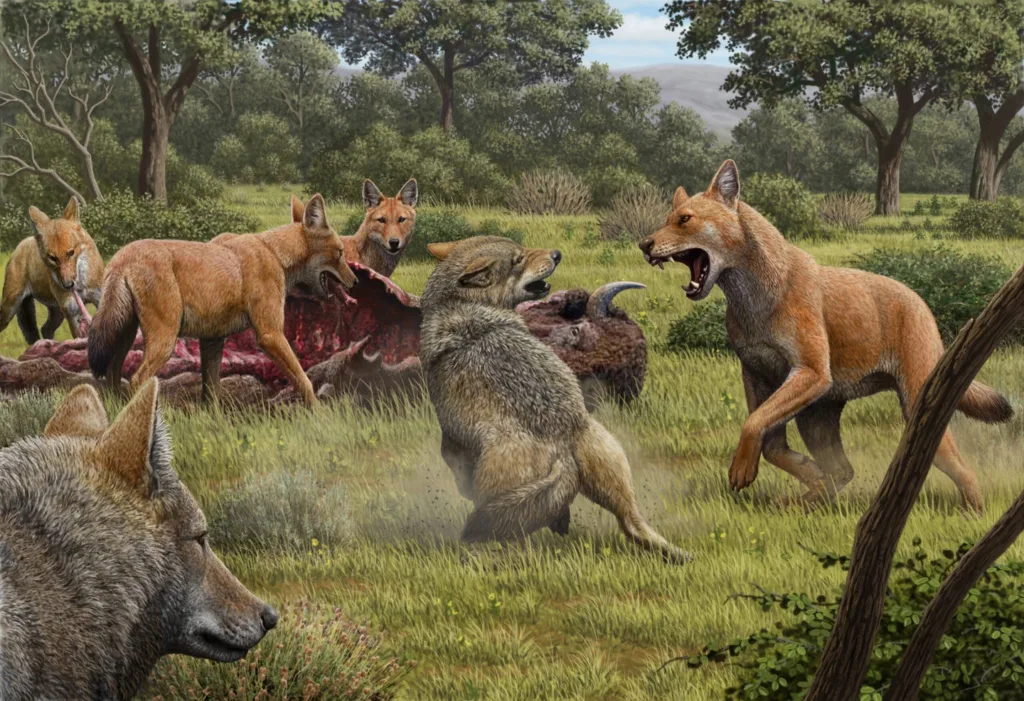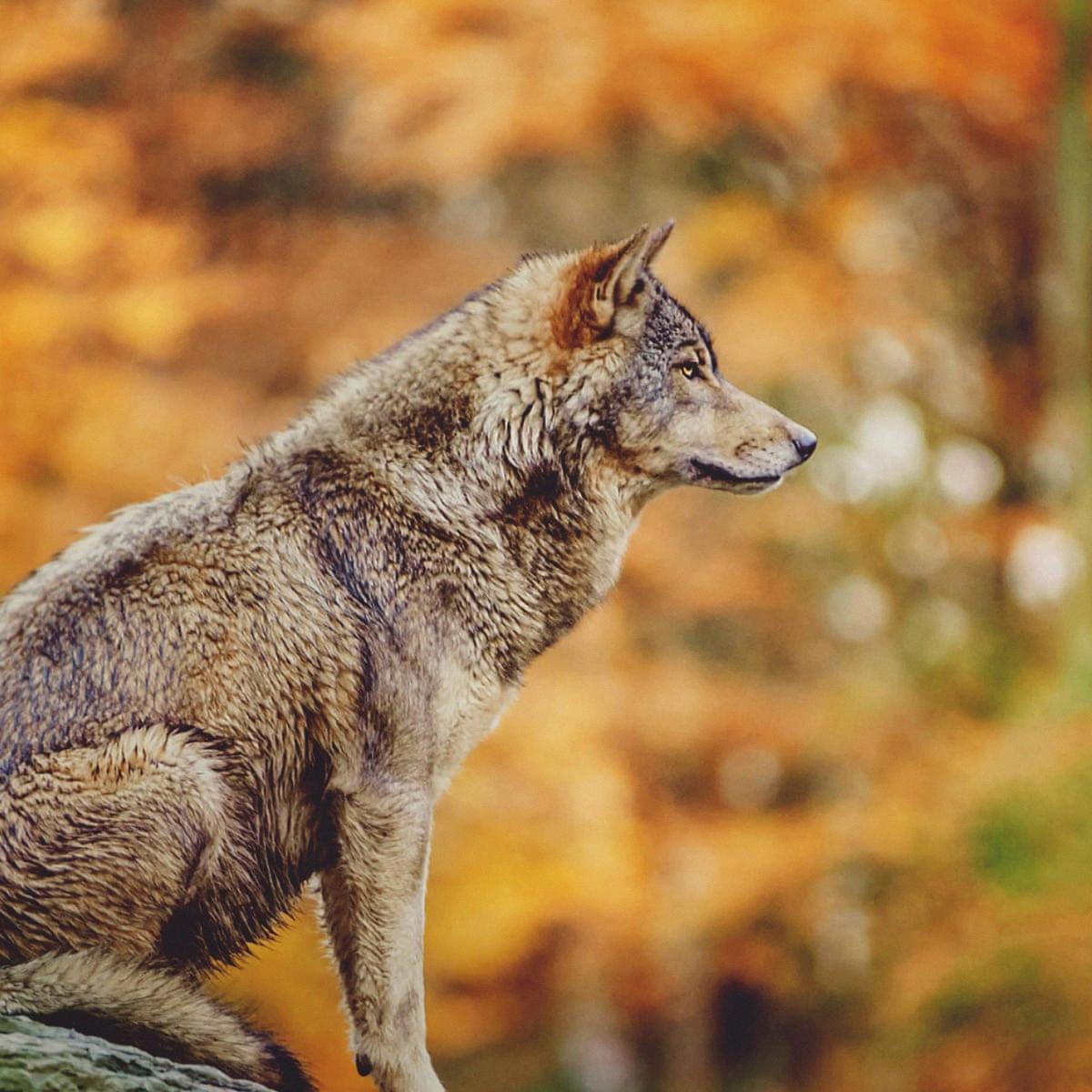Wolves and foxes are both members of the Canidae family, which means that they share some similarities in their physical characteristics and behavior. However, when it comes to their diet, wolves and foxes have different preferences.
Wolves are known for their hunting skills and their ability to take down large prey such as deer, elk, and moose. However, they are also opportunistic feeders and will eat almost anything if they are hungry enough. This includes smaller animals like rabbits, rodents, and yes, even foxes.
While wolves and foxes may share the same habitat, they generally avoid each other. However, if a wolf comes across a fox, it may chase and kill it if it is hungry. This is especially true during the winter months when food is scarce and wolves are more likely to hunt smaller prey.
Foxes, on the othr hand, are primarily carnivorous and feed on small animals such as rodents, rabbits, and birds. They are also known to scavenge for food and will eat fruits and berries when they are available.
It is important to note that while wolves may eat foxes, it is not a common occurrence. Wolves prefer to hunt larger prey and will only resort to eating smaller animals if they have no other options. Additionally, foxes are fast and agile, making them difficult prey for a wolf to catch.
While wolves may eat foxes, it is not a regular part of their diet. Both animals have different preferences when it comes to food, and while they may share the same habitat, they generally avoid each other unless they are competing for resources.
Can Wolves Eat Foxes?
Yes, wolves do eat foxes. Wolves are known to be opportunistic predators and will eat a variety of prey depending on availability and season. Foxes are smaller in size than wolves and are often considered a prey item for them. Wolves are pack animals, and they can hunt down a fox together as a group. They may also scavenge on foxes that have already been killed by other predators. In addition to foxes, wolves also feed on deer, elk, moose, and other small mammals.

Do Foxes and Wolves Coexist?
Foxes and wolves generally do not get along, despite sharing the same habitat. While they belong to the same broad canine family, they have very distinctive differences. Wolves are much larger than foxes and they hunt in packs, while foxes are solitary hunters. Wolves may chase and kill foxes if they catch them, but they usually do not bother with them. Furthermore, foxes and wolves cannot interbreed, which indicates that they have significant biological differences. Thus, it is safe to say that foxes and wolves do not get along and have very little in common.
Predators of the Fox
A predator to a fox is an animal that preys on them for food or considers them a threat. Young red foxes are typically hunted by eagles and coyotes. On the other hand, mature foxes can be attacked by larger predators such as bears, wolves, and mountain lions. However, human beings are the most significant threat to adult foxes, who are often hunted for their fur or killed as they are considered pests. Therefore, foxes have to be constantly vigilant and aware of their surroundings to avoid being caught by their predators.
Can Foxes and Wolves Interbreed?
No, foxes and wolves cannot mix or hybridize as they belong to different genera and have diverged millions of years ago. While both belong to the wider dog family, Canidae, foxes and wolves have significantly different physical and behavioral characteristics, and cannot produce viable offspring. Additionally, their chromosome counts differ, which further prevents interbreeding. It is important to note that while some species within the Canidae family can hybridize, such as wolves and coyotes, this is not the case for all members of the family.
Do Foxes Fear Wolves?
Foxes can be afraid of wolves, especially when they sense danger or when they are near wolf pups. However, foxes are generally well adapted to living alongside wolves and have developed certain strategies to minimize the risks of being preyed upon by wolves. One such strategy is to avoid wolves altogether by staying in dens or hiding in thick vegetation. In some cases, foxes may even try to steal food from wolves or scavenge on their kills. Interestingly, in North America, wolves are actually helpful to foxes, as they help control populations of oter predators such as coyotes, which can be a greater threat to foxes. Overall, while foxes may have a healthy respect for wolves, they are not necessarily their enemies and can coexist peacefully in the same ecosystem.

Source: roundglasssustain.com
Fear of Foxes
Foxes are generally afraid of loud noises, water hoses, water guns, and thrown objects. These tactics can be effective in scaring away bold foxes. It is important to note, however, that these methods shold be used with caution and should not harm the animal. Additionally, if a fox shows signs of rabies or mange, or if your pet is bitten by a fox, it is important to contact your local animal control agency, police department, or health department for assistance. Overall, it is best to avoid direct contact with foxes and to give them their space in order to prevent any potential conflicts.
The Outcome of a Wolf Versus Tiger Showdown
In a hypothetical fight btween a wolf and a tiger, the tiger would likely come out as the victor. This is primarily due to the tiger’s size and strength advantage over the wolf. Tigers can weigh up to 600 pounds, while wolves typically weigh around 100 pounds. Additionally, tigers are faster and more agile than wolves, able to run up to 40mph.
Furthermore, tigers are skilled hunters, often taking down prey much larger than a lone wolf. Wolves typically hunt in packs, using their numbers to take down larger animals, but they rarely come across anything as deadly as a tiger. Even if a pack of wolves were to attack a tiger, it is unlikely that they would be able to overpower it due to the tiger’s superior size and strength.
In short, while wolves are formidable predators, a one-on-one fight against a tiger would likely result in the tiger emerging as the winner.
Are Wolves Closer to Foxes or Dogs?
Based on scientific research, wolves are closer to dogs than foxes. In fact, the modern-day gray wolf is believed to be the closest ancestor of all modern dogs. While foxes are also cousins to wolves and dogs, they diverged from the wolf lineage about 12 million years ago, which is a relatively brief time period in terms of evolution. Therefore, while wolves and foxes share some genetic similarities, dogs share a much closer genetic relationship with wolves.
The Impact of Wolves on Foxes
Yes, wolves can hurt foxes. While wolves typically avoid humans and are shy and cautious around them, they can be aggressive towards other canids like foxes, coyotes, and dogs. In some cases, if food is scarce, a wolf may attack and kill a fox as a means of survival. However, it’s important to note that this is not a common occurrence, and wolves generally do not actively seek out foxes as prey.

Source: theguardian.com
The Relationship Between Foxes and Wolves and Cats
Foxes are actually closer to wolves than they are to cats. Both foxes and wolves belong to the Canidae family of animals, which means they are both canines. This family also includes domestic dogs, coyotes, and jackals. Cats, on the other hand, belong to the Felidae family of animals, which includes wild cats like lions, tigers, and cheetahs, as well as domestic cats. Despite their similar appearance, foxes and cats are not closely related and have distinct evolutionary lineages. Therefore, it can be concluded that foxes are closer to wolves than they are to cats.
Can Foxes Harm Dogs or Cats?
While foxes are generally not aggressive towrds dogs or cats, there are some cases where they may attack. Foxes are naturally skittish animals that prefer to avoid confrontation and will usually flee from larger animals. However, if a fox feels threatened or cornered, it may defend itself by biting or scratching. In these cases, a dog or cat may be injured.
It’s important to note that adult cats are generally safe from fox attacks, as they are agile and can climb trees to escape. However, kittens may be vulnerable to fox predation. Additionally, small dogs may be more at risk than larger breeds, as they may be viewed as prey by a fox.
To prevent potential conflicts with foxes, it’s important to keep pets supervised and on leashes when outdoors. If you live in an area where foxes are common, it’s also a good idea to secure trash cans and remove any potential food sources, as this can attract foxes to your property. By taking these precautions, you can help keep your pets safe and avoid conflicts with these wild animals.
The Potential Danger of Foxes to Humans
Foxes are not known to attack humans unless they are provoked, cornered, or feel threatened. In general, foxes are timid animals and avoid human contact whenever possible. They prefer to keep their distance and flee if they detect the presence of a human. However, it is important to note that wild animals, including foxes, can be unpredictable, and it is best to avoid approaching or disturbing them. Additionally, it is important to keep in mind that in rare cases, a fox may carry rabies, which can cause aggressive behavior towards humans. It is alwas best to exercise caution and respect when encountering any wild animal.
Can Foxes Connect with Humans?
Yes, a fox can develop a liking towards humans if it is raised in captivity and exposed to human interaction from an early age. However, in the wild, foxes are generally timid and avoid human contact. The domestication experiment conducted in Russia with silver foxes has shown that selective breeding can indeed result in a population of foxes that are not afraid of humans and even enjoy their company, behaving like dogs in their social behavior. Nonetheless, it is important to note that while domesticated foxes may display affectionate behavior towards humans, they are stil wild animals and require special care and handling to ensure their well-being.

Source: a-z-animals.com
Conclusion
In conclusion, whie wolves and foxes may share the same habitat and belong to the same broad canine family, wolves do occasionally eat foxes, but it is not a common occurrence. Wolves may chase and kill a fox if they catch it, but they mostly avoid them. On the other hand, foxes are preyed upon by various animals such as bears, mountain lions, eagles, and wolves. Therefore, it’s safe to say that wolves can eat foxes, but it’s not their primary source of food. It’s essential to note that both wolves and foxes play a crucial role in the ecosystem, and we should respect their natural roles and habitats.
